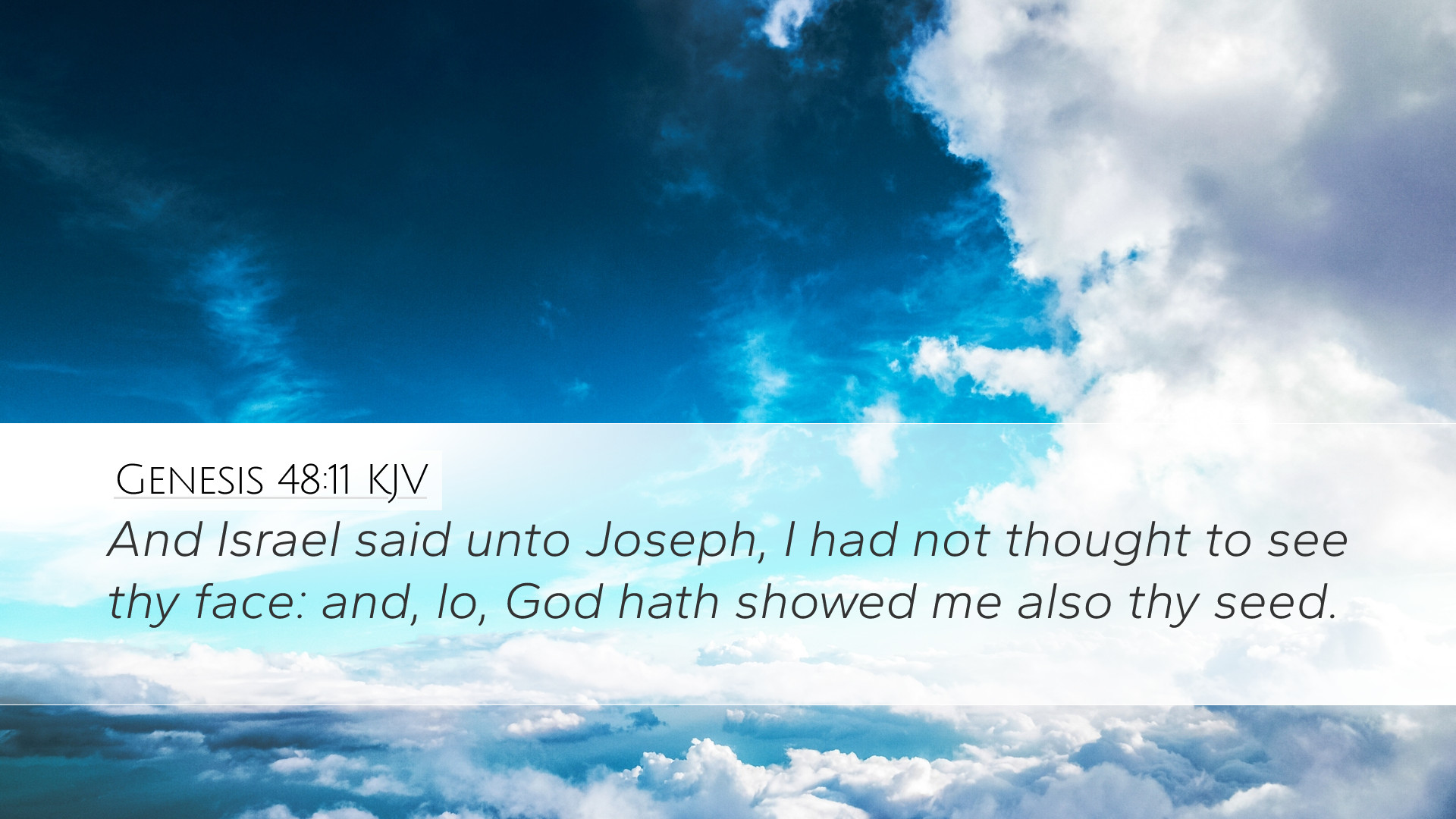Commentary on Genesis 48:11
Verse: "And Israel said unto Joseph, I had not thought to see thy face: and, lo, God hath showed me also thy seed." (Genesis 48:11, KJV)
Contextual Background
The setting of Genesis 48 is vital for understanding the significance of this passage. Jacob, later called Israel, was nearing the end of his life. He had crossed into Egypt with his family during a time of famine, and now he is confronted with the reality of his imminent death.
This moment of blessing is filled with both personal and theological significance, reflecting Jacob's perspective on life, faith, and God’s providence.
Thematic Insights
- Faith and Providence:
Matthew Henry observes that Jacob expresses profound faith in God's providence. His exclamation reveals both surprise and gratitude for witnessing his son Joseph and his grandchildren, reaffirming God's promises.
- Hope Beyond Loneliness:
Albert Barnes elaborates on Jacob's loneliness and the trials he faced during his life. Seeing Joseph and his seed (grandchildren) serves as a beacon of hope, reminding believers that God often provides in unexpected ways.
- Generational Promises:
Adam Clarke emphasizes the significance of blessings extending to future generations. Jacob's acknowledgment of Joseph's sons demonstrates the continuity of God's covenant promises.
Exegesis of Key Terms
"I had not thought to see thy face": This phrase captures Jacob’s profound amazement. After years of believing Joseph was dead, Jacob's overwhelming joy reflects the theme of resurrection and restored relationships in Scripture.
"God hath showed me also thy seed": The phrase indicates divine revelation and the fulfillment of God's promises. Jacob recognizes his lineage’s continuation and the active role God plays in preserving his family.
Theological Implications
- The Assurance of God's Presence:
This passage illustrates that even in times of apparent abandonment, God remains faithful, providing moments of profound comfort and assurance. Jacob's experience reminds us that even in the twilight of life, God’s presence can illuminate darkness.
- The Importance of Legacy:
Jacob’s focus on his grandchildren emphasizes the significance of leaving a godly legacy. The blessing of Joseph’s sons is a reminder to Christians of their responsibility to pass on faith to future generations.
- Fulfillment of Divine Promises:
Jacob's vision of his grandchildren symbolizes the fulfillment of God's promises to Abraham, Isaac, and himself. This verse encompasses the broader narrative of Scripture where God faithfully fulfills His Word.
Practical Applications for Believers
This passage has profound applications for modern readers:
- Recognizing God’s Goodness:
Like Jacob, we are encouraged to recognize and give thanks for God’s blessings in our lives, often amidst trials and loneliness.
- Strengthening Family Ties:
Believers are reminded to cherish their familial relationships and invest in the spiritual growth of their children and grandchildren.
- Living with Hope:
No matter the circumstances we face, we can hold onto the hope that God is actively working in our lives and the lives of those we love.
Concluding Thoughts
Genesis 48:11 is not merely a moment of reunion; it encapsulates the essence of God’s faithfulness throughout the generations. Jacob's heartfelt acknowledgment serves as a powerful reminder for all believers that amidst life's trials, God can surprise us with blessings that solidify our faith and provide hope for the future.


